The world of college athletics was turned on its head Wednesday, and it only took 24 pages of writing.
Peter Sung Ohr, of the National Labor Relations Board, issued a decision last week that gives football players at Northwestern University the power to unionize, a landmark decision for college athletics
Ohr’s ruling validates the Northwestern players’ claim that they should be classified as “employees” of the university and its coaching staffs. The ruling was based on the legal definition of an employee as, “a person who performs services for another under a contract of hire, subject to the other’s control or right of control, and in return for payment.”
Ohr liberally applies this definition to the lifestyle of a Northwestern football player on scholarship. He views an athletic scholarship as a “contract,” its monetary aid as “payment,” the players’ time spent playing football as “service,” and their coaches as the “other” in control. Additionally, Ohr points to the economic benefit and reputation generated for the university by the team, arguing that they also contribute to an atypical college experience for student-athletes.
By allowing the players to form a union, Ohr is also permitting them to engage in all activities typical of a union. For example, scholarship athletes would, hypothetically, have a say in matters such as practice scheduling and scholarship negotiation.
Ohr’s ruling won’t change anything in the short term. Northwestern University and the NCAA have already publicly disapproved of the decision and a conclusion to this ongoing debate likely won’t be reached for years.
What Ohr’s ruling does do, however, is provide a tangible victory for the movement among college athletes to earn a seat at the table in the management of their lives during college. In their view, the ability to negotiate with their superiors would effectively level the playing field in college athletics.
The debate gets complicated, however, due to Ohr’s definition of a “student-athlete.” He finds that the time commitment and meticulous schedule of the Northwestern players, make their relationship with the coaching staff more like that of an employer and an employee than that of a school and a student.
Northwestern, on the other hand, like all colleges, advertises a “student first, athlete second,” stance. According to administrators, the privilege of attending college for free is more than enough compensation for any loss of freedom a student-athlete might experience. Any call for unionization is, to them, a cry for an advantage over non-athletes.
For Ohr, and myself, this view represents a naïve characterization of an athlete’s lifestyle. College athletes, especially those in revenue-generating sports like basketball and football, are not “students first, and athletes second.”
Take our men’s basketball team. On any given day, they may participate in a high-octane practice, a cross-country trip, a nationally televised game, or a press conference. Their primary focus is not academics, and it couldn’t be even if that’s what they wanted. Their time commitment, coupled with the revenue generated by their play, makes them de facto employees of the University.
No matter what jargon is put forth by the administration, for most, sport will be there main focus. If they were truly students first, any basketball player should be able to quit the team tomorrow to focus on his academics. Alas, such a decision would likely lead to their scholarship being taken away, and, for many, would signal the end of their ability to pay. Just a breach of contract, I suppose.
Unless universities are willing to make the educational “privilege” they claim to provide student-athletes with fully accessible, the right to unionize is a necessary concession. The double standard of inhibiting student-athletes’ right to be “just students,” then claiming they are abusing this same right by unionizing, is laughable. Administrations need to wise up quickly, because the façade of “privilege” they have used to marginalize student-athletes for decades is slowly lifting.




